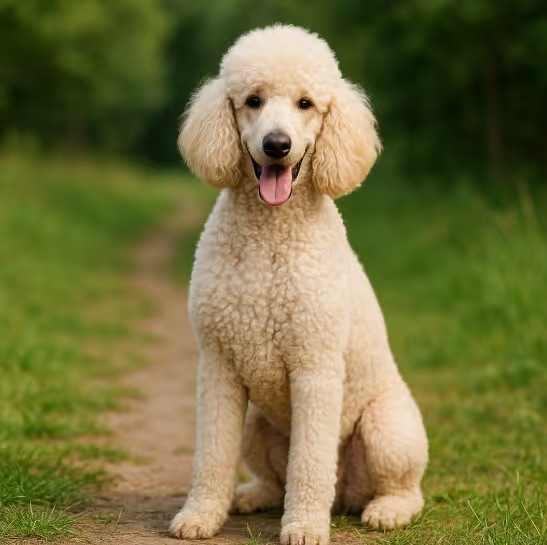The Poodle is a highly intelligent, elegant, and versatile breed known for its signature curly coat and exceptional trainability. Available in three sizes — Standard, Miniature, and Toy — Poodles are adaptable to a wide range of living environments. Despite their dignified appearance, Poodles are energetic, playful, and make wonderful family companions. Their hypoallergenic coat makes them a preferred choice for allergy sufferers.

The Poodle has a long and fascinating history tracing back to Germany as a water retriever, though it became standardized in France where it rose in popularity. Its name derives from the German word “pudel,” meaning “to splash in water.” Originally bred for duck hunting, the Poodle's intelligence and hypoallergenic coat made it a staple among nobility and circus performers. Over time, breeders developed three distinct size variations: Standard (original), Miniature, and Toy.
Poodles require regular grooming to maintain their iconic curly coat and prevent matting. Their hair grows continuously and must be clipped every 4–6 weeks.
Grooming Checklist:
Poodles are active and athletic, especially Standards. They require regular physical and mental stimulation.
Poodles are considered among the most intelligent dog breeds and are eager to learn.
Training Recommendations:
💡 Tip: Miniature and Toy Poodles may develop “small dog syndrome” without consistent boundaries.
Nutrition needs vary by size and age. Standard Poodles, in particular, are prone to bloat, so meal timing and portions matter.
Because of their popularity, Poodles are available through breed-specific rescues and reputable breeders.
Where to Start:
1. Are Poodles hypoallergenic?
Yes — their curly, low-shedding coat produces less dander, making them ideal for many allergy sufferers.
2. What’s the difference between Toy, Miniature, and Standard Poodles?
Size! All have the same temperament and coat, but vary by weight and height.
3. How often do Poodles need grooming?
Every 4–6 weeks for clipping, brushing 2–3 times weekly. [See full grooming tips above.]
4. Are Poodles good with kids?
Yes — especially Miniature and Standard Poodles. Toy Poodles can be more fragile around toddlers.
5. Are Poodles easy to train?
Very. They rank among the top 3 most trainable breeds in the world.
6. Can Poodles live in apartments?
Yes — Toy and Miniature Poodles are well-suited for apartments if properly exercised.